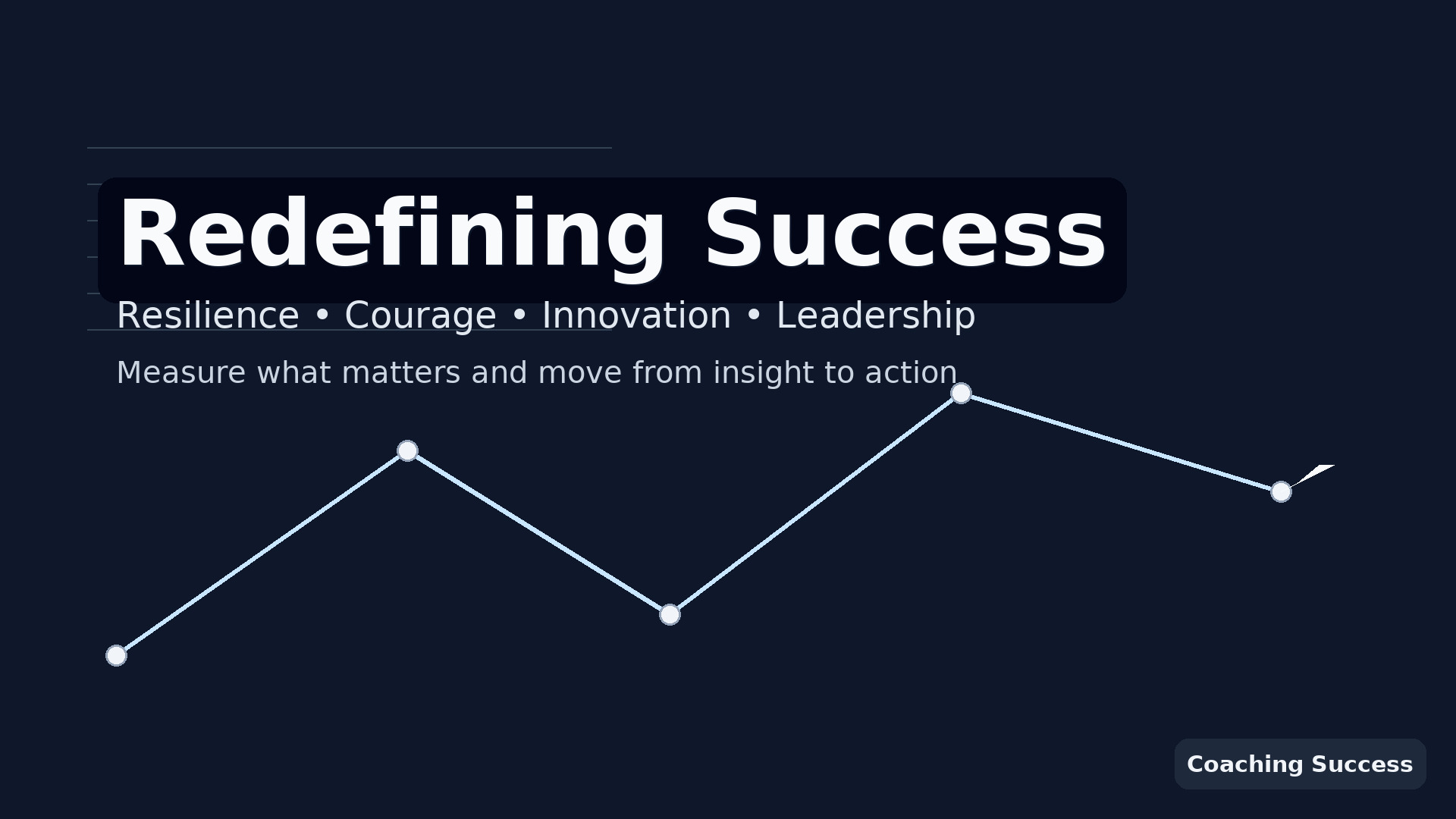Success | Definition & Meaning
What makes someone successful? Success is more than just wealth or status. It’s about achieving your personal and professional goals. This article will help you explore different definitions of success and provide practical tips for achieving it. Discover how personal growth, resilience, and courage play a pivotal role in your journey towards success.
Key Takeaways
- Success is subjective; it varies with individual values and experiences, underscoring the importance of personal fulfillment alongside societal norms.
- Key factors such as resilience, leadership, and personal growth are crucial for overcoming challenges and achieving success in both personal and professional arenas.
- Moral courage and innovative thinking are essential traits for leaders, fostering ethical environments and driving creativity that contributes to long-term success.
Own Your Definition of Success (15-min chat)
If success is personal, your game plan should be too. Book your 15-minute call
Understanding Success

Success is a highly subjective concept influenced by individual values, backgrounds, and societal norms. What one person views as success might be entirely different from another’s perspective. Individual values, including social, political, and religious beliefs, play a significant role in shaping one’s perception of success. For instance, achieving financial stability might be the pinnacle of success for some, while personal fulfillment and happiness could be more critical for others.
Personal criteria for success often diverge significantly from societal norms, making it a uniquely subjective experience. Many people find success in reaching personal goals, irrespective of external approval or societal standards. Common societal definitions of success often emphasize financial achievement, but personal fulfillment can also be crucial in defining what it means to be successful.
Historically, success has been aligned with social, political, and economic ideals, reflecting the values of the times. Contemporary definitions often emphasize material wealth and societal approval, but these do not capture the full complexity of success. Cultural influences and personal experiences significantly shape one’s understanding of achievement. Examining these diverse perspectives helps us better grasp the multifaceted nature of success.
Turn Insight into Action—This Week
You’ve reflected; now implement the next step with me. Grab a spot on my calendar
Key Factors for Achieving Success

Achieving success is no small feat; it requires several key factors working in tandem. One of the most critical elements is resilience—the ability to maintain focus on goals and motivations despite facing challenges. Resilience helps individuals and organizations bounce back from setbacks and continue striving towards their objectives. Closely monitoring and quickly responding to challenges is another crucial aspect.
Effective economic management and accountability also play essential roles in achieving much success. Utilizing interventionist techniques to remain accountable ensures that goals are met and progress is accurately tracked. Leadership skills, practice, and qualities such as perseverance and determination are equally important. Leaders who embody these principles can guide their teams through difficulties, fostering an environment conducive to success.
Build Resilience that Pays Dividends
Let’s design habits that bounce back—stronger. Schedule your call
The interplay between these factors—resilience, economic management, and leadership—creates a robust framework for achieving success. Focusing on these elements enables individuals and organizations to overcome obstacles and reach their desired outcomes.
The Role of Personal Growth in Success
Personal growth is a cornerstone of success, both personally and professionally. Continuous learning is fundamental to both personal and professional growth, empowering individuals to acquire the skills and knowledge needed to navigate and adapt to diverse challenges. In a rapidly changing world, the ability to learn and evolve is crucial for staying relevant and achieving success.
However, personal growth often requires individuals to step beyond their comfort zones. This process is essential for unlocking potential and fostering significant personal development. It is through these challenging experiences that individuals discover their strengths and capabilities, paving the way for greater achievements.
In the workplace, personal growth can significantly impact success. Leaders who prioritize their own personal growth and encourage their teams to do the same cultivate a culture of continuous improvement and development. This approach not only enhances individual performance but also contributes to the organization’s overall success.
Moral Courage and Success
Moral courage is a vital component of success, particularly in leadership. It involves acting on one’s principles and values, even in the face of fear or adversity. Leaders who demonstrate moral courage foster respect among their team members, creating a healthier, more supportive team environment. However, an inflated self-image regarding moral courage can lead to lower respect for team members and diminished effectiveness.
Historical examples of moral courage provide valuable lessons in history and the Nicomachean Ethics. John Lewis, for instance, endured physical assaults during civil rights demonstrations, exemplifying his commitment to racial equality. Similarly, Johnson & Johnson is renowned for its ethical leadership, notably pulling 31 million Tylenol bottles off shelves after a cyanide poisoning incident, prioritizing customer safety and transparency.
Conversely, the lack of moral courage can have severe consequences. Wells Fargo faced significant repercussions due to unethical practices encouraged by its leadership, leading to a loss of customer trust and a 50% decline in profits following a scandal. These examples highlight the critical role of moral courage in achieving and maintaining success.
Moral courage is closely linked with other virtues such as honesty, humility, and accountability. Leaders who embody these qualities are better equipped to navigate challenges and inspire their teams. Acting with integrity and authenticity allows leaders to build a foundation of trust and respect — crucial for long-term success — guided by their conscience.
Lead with Courage. Grow with Clarity.
If moral courage matters, so does your next decision. Book a 15-minute strategy chat
Physical Courage: An Overlooked Aspect
Physical courage is often overlooked in discussions about success, yet it plays a crucial role in confronting fear or danger. This form of courage is particularly important in professions that involve significant risks or moral dilemmas. Historical figures who exhibited physical courage provide powerful examples of this virtue, in contrast to acts of cowardice.
Examples of extraordinary physical courage include:
- Oskar Schindler, who risked his life to save over 1,200 Jewish people during the Holocaust, embodies physical courage and altruism.
- Malala Yousafzai, who advocates for girls’ education despite being shot by the Taliban.
- Nelson Mandela, whose lengthy imprisonment for fighting apartheid is a testament to extraordinary physical courage.
Recognizing and valuing physical courage is essential in understanding the multifaceted nature of success. Acknowledging the depth and presence of this respected virtue enables us to appreciate the full spectrum of qualities that contribute to achieving fearlessness in success, making sense of the journey.
Success Through Innovation and Creativity

Innovation and creativity are pivotal in achieving success in today’s competitive environment. Innovation is defined as a novel and useful product, service, business model, or strategy. There are two main types of innovation: sustaining innovation, which improves existing products for current customers, and disruptive innovation, which challenges larger businesses by creating new market segments.
Adopting a design thinking approach helps organizations foster innovation by focusing on human-centred solutions. This approach involves four phases:
- Clarifying the problem
- Ideating solutions
- Developing prototypes
- Implementing the final idea
Successful innovation requires a balance between creativity and operational efficiency within an innovative organization that is often opposed by traditional methods.
Collaborative leadership is particularly effective in dynamic markets where innovation and adaptability are critical for success. Companies that prioritize employee experience through collaborative practices can be four times more profitable than those that do not. Creating a culture that encourages creativity and innovation enables organizations to achieve long-term success.
From Ideas to Innovation (Without the Chaos)
Map a simple, test-and-learn plan for your next move. Reserve your time
The Importance of Resilience in Overcoming Hardship
Resilience is crucial for success, enabling individuals to recover from setbacks and maintain focus on their goals. Key elements include:
- Embracing discomfort by stepping out of comfort zones to enhance resilience and self-confidence.
- Taking calculated risks.
- Accepting failure as a learning experience is integral to personal growth and success.
Innovation can significantly enhance a company’s ability to adapt to unforeseen challenges. Mettle suggests an individual’s inherent ability to face challenges with resilience, giving the concept of personal strength deeper meaning. Tenacity implies persistent determination and refusal to admit defeat, essential in overcoming obstacles.
Maintaining a strong mental spirit helps individuals maintain morale even in the face of significant opposition. Cultivating resilience and fortitude helps individuals and organizations persevere through hardships and achieve their goals.
Tenacity > Talent
If you’re ready to execute consistently, I’m ready to help. Let’s talk for 15 minutes
The Influence of Leadership Style on Success

Leadership style greatly influences organizational success by shaping workplace culture and employee engagement. Transactional leadership provides clear guidelines and quick results, making it suitable for environments with established processes, but it may limit creativity. Transformational leadership can inspire teams with a compelling vision, but it also faces challenges such as burnout and over-dependence on the leader.
Collaborative leadership fosters teamwork and can make teams up to 4.6 times more effective by encouraging open communication and shared decision-making. Moral courage in leaders supports an open culture where team members feel safe to express their true opinions. Effective leaders who practice moral courage are likely to encourage diverse viewpoints, enhancing decision-making quality.
Ethical leadership fosters a positive corporate culture, enhancing employee engagement and reducing turnover —both critical for long-term success. Organizations with ethical leaders prioritize the needs of customers and communities, leading to stronger brand loyalty and sustainable business practices. The influence of leadership style on success cannot be overstated.
Align Leadership Style to Real Results
We’ll tune your approach to your team and goals. Book your call
Measuring Success: Beyond Financial Gains
Financial gains do not measure success alone; personal fulfillment, including happiness and life satisfaction, is a significant indicator of success. Assessing the positive impact of one’s actions on the community and society is also vital when measuring success.
Selecting appropriate metrics for success should align with individual values and lifestyle, including career, personal, and emotional well-being. Looking beyond financial metrics allows individuals to achieve a more holistic and meaningful definition of success, serving as a testing point for their overall fulfillment.
Redefine Success—On Your Terms
Measure what matters: fulfillment, impact, and traction. Start here (15 minutes)
Examples of Successful Leaders and Organizations

Successful leaders exemplify ethical decision-making by prioritizing the well-being of customers and employees. Johnson & Johnson responded to a public health crisis by recalling all Tylenol products, prioritizing customer safety over profits. Starbucks’ leadership addressed a racial bias incident by implementing company-wide training and closing stores for education.
Examples of leadership accountability include:
- Kathryn Minshew, CEO of The Muse, chose to sever ties with a client who mistreated her team, emphasizing the importance of employee respect.
- Accountability in leadership fosters trust and can mitigate customer dissatisfaction in challenging situations.
- JetBlue’s CEO took accountability for a major operational failure by issuing a public apology and establishing a customer bill of rights.
These examples highlight how heart-centred leaders and heart-centred leadership styles foster a positive impact on teams, communities, and society, enhancing the lives of those involved.
Summary
The journey to success is multifaceted, involving personal growth, moral and physical courage, innovation, resilience, and effective leadership. Each of these elements plays a crucial role in defining and achieving success. By understanding the diverse perspectives and components of success, individuals and organizations can better navigate their paths to meaningful, sustainable success.
Ultimately, success is a personal journey. It is about aligning one’s actions with their values, continuously growing, and making a positive impact on the world. As readers reflect on their own definitions of success, may they be inspired to pursue their goals with passion, integrity, and resilience.
Frequently Asked Questions
What are the key factors for achieving success?
To succeed, focus on resilience, effective management, accountability, and strong leadership. Embrace these factors, and you’ll pave your way to greatness!
How does personal growth impact success?
Personal growth directly fuels success by equipping you with new skills and pushing you beyond your comfort zone. Embrace the journey of self-improvement, and watch your achievements soar!
What is the role of moral courage in success?
Moral courage is essential for success as it empowers you to act on your principles and earn the respect and trust of others, creating a strong foundation for leadership. Embrace your values, even in challenging situations, and watch your path to success unfold!
Why is physical courage important for achieving success?
Physical courage is crucial for tackling fears and challenges, especially in high-risk situations, and it empowers you to overcome obstacles on your path to success. Embrace this courage to elevate your journey and achieve your goals!
How can success be measured beyond financial gains?
Success goes beyond financial gains; it’s about personal fulfillment, life satisfaction, and the positive impact you make on your community. Remember, true success is measured by how you uplift others and find joy in your journey!



